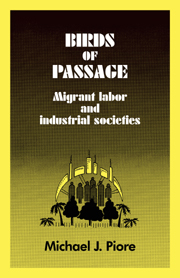Book contents
- Frontmatter
- Contents
- Preface
- 1 Introduction
- 2 The jobs
- 3 The migrants
- 4 Particular characteristics of the migrant labor market
- 5 The impact of migration on the place of origin
- 6 The historical evolution of long-distance migration in the United States
- 7 The dilemmas of current U.S. immigration policy
- Notes
- Bibliography
- Index
5 - The impact of migration on the place of origin
Published online by Cambridge University Press: 28 October 2009
- Frontmatter
- Contents
- Preface
- 1 Introduction
- 2 The jobs
- 3 The migrants
- 4 Particular characteristics of the migrant labor market
- 5 The impact of migration on the place of origin
- 6 The historical evolution of long-distance migration in the United States
- 7 The dilemmas of current U.S. immigration policy
- Notes
- Bibliography
- Index
Summary
The migration process discussed in the preceding chapters is anchored in the place of origin, generally an underdeveloped country or a backward region of an industrial economy. The changes in the place of origin produced by the migration constitute the “other” half of the process. They are not the immediate focus of this volume, but it is obviously impossible to discuss the process in the receiving area without some reference to them. This chapter is directed toward that end.
In public-policy analysis, and in most scholarly publications as well, migration from backward to developed areas has been thought to affect the place of origin in two critical ways. First, migration is supposed to contribute to economic development. Second, it is often argued that the out-migration serves as a “safety valve,” relieving both the physical pressure of growing populations and the political and social pressures generated by the aspirations for higher income, which the developing country cannot, or at least cannot yet, meet. Both of these factors are discussed in this chapter, along with the relationship between external and internal migration patterns in developing countries.
Migration and economic development
The most prominent views of the relation between international migration and economic development have been articulated in the context of the postwar population movements in Western Europe between the industrialized North and the less-developed countries on the southern and eastern fringes of the continent, and in Africa and the Middle East. These envisage two principal contributions to the development process. First, the migrant remittances have been thought to provide critically needed foreign exchange.
- Type
- Chapter
- Information
- Birds of PassageMigrant Labor and Industrial Societies, pp. 115 - 140Publisher: Cambridge University PressPrint publication year: 1979



